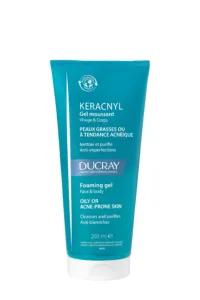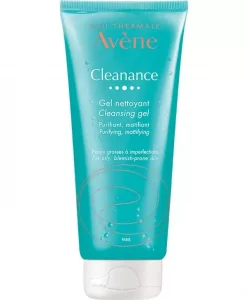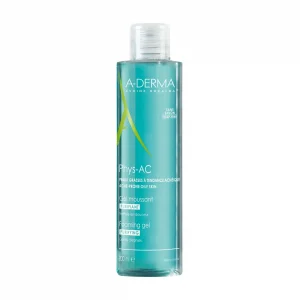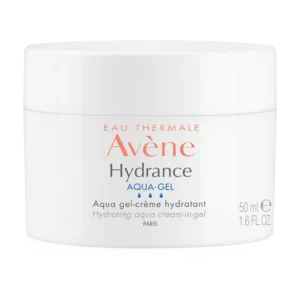
Oily skin can be a real challenge for those who have it. From frequent breakouts to a constant shine, it can feel like a never-ending battle to keep your complexion under control. But fear not, with the right knowledge and strategies, you can turn your oily skin into a glowing, radiant complexion. Whether you’re looking for expert skincare advice or product recommendations, we’ve got you covered. Get ready to say goodbye to the grease and hello to beautiful, balanced skin.
In this article and in collaboration with Dr. Rasha Farouk, we’ll explore the causes of oily skin, and expert tips for managing and preventing breakouts.
What are the main culprits behind oily skin?
According to Dr. Rasha Farouk, common characteristics of oily skin include a shiny appearance and frequent breakouts, oily texture, enlarged and visible pores, makeup that can be easily removed, and less visible wrinkles.
Several factors can contribute to oily skin, including genetics, hormonal imbalances, and environmental factors.
- Genetics: The amount of oil that your skin produces is largely determined by your genes. If your parents have oily skin, there’s a good chance that you will too.
- Hormonal imbalances: Hormones play a significant role in the production of oil in the skin. During puberty, hormonal changes can cause an increase in sebum production, leading to oily skin and acne. Hormonal imbalances can also occur during pregnancy, menopause, and times of stress.
- Environmental factors: If you have oily skin, high humidity can increase sebum production and trap too much moisture in your skin. While a certain amount of sebum is essential for healthy skin, overproduction of sebum leads to oily, greasy skin. Exposure to pollutants, such as cigarette smoke and air pollution, can also contribute to oily skin.
What are the top skin care products for managing oil?
When it comes to managing oily skin, the right skincare products can make all the difference. Here are some of the best skin care products for oily skin:
1- Cleanser:
A gentle, oil-free cleanser is essential for oily skin. Look for a cleanser that contains salicylic acid or benzoyl peroxide, which can help unclog pores and reduce oil production. Avoid harsh scrubs or exfoliants, which can irritate your skin and cause more oil production. Dr. Rasha Farouk points out that people with oily skin should cleanse their face twice a day, according to the American Academy of Dermatology.
Our favourites:
Ducray Keracnyl Foaming Gel

Eau Thermale Avène Cleanance Cleansing Gel
A-Derma Phys-AC Foaming Gel
2- Moisturizer:
Even oily skin needs moisture, but it’s important to choose a lightweight, oil-free moisturizer that won’t clog pores. Look for a moisturizer that contains ingredients like hyaluronic acid or glycerin, which can hydrate the skin without adding excess oil. Dr. Rasha Farouk indicates that skin ingredients that are particularly effective in treating oily skin are retinol, niacinamide, salicylic acid, hyaluronic acid, clay, and tea tree oil.
Our favourite:
Eau Thermale Avène Hydrance Aqua-Gel
3- Sunscreen:
Sunscreen is essential for protecting the skin from harmful UV rays, but it’s important to choose a sunscreen that won’t make your oily skin worse. Look for a lightweight, oil-free sunscreen that won’t clog pores or leave a greasy residue.
Our favourite:
Eau Thermale Avène Very High Protection Fluid SPF 50+
Expert Tips for Managing Oily Skin
Managing oily skin can be challenging, but by following some basic dos and don’ts, you can keep your skin looking healthy and radiant. Here are some tips:
Dos:
1- Cleanse your skin regularly: Cleansing your face twice a day can help remove excess oil and dirt from your skin. Be gentle when washing your face and avoid using hot water, which can strip your skin of its natural oils.
2- Use oil-free and non-comedogenic products: Use oil-free moisturizers, sunscreens, and makeup products that won’t clog your pores. Look for products that are labeled “non-comedogenic,” which means they won’t cause acne.
3- Use a toner: Toners can help remove any residual oil and dirt from your skin after cleansing. Choose a toner that contains salicylic acid or glycolic acid, which can help control oil production and reduce pore size.
4- Exfoliate regularly: Exfoliating your skin once or twice a week can help remove dead skin cells and unclog pores. Use a gentle exfoliating scrub that won’t irritate your skin.
5- Use blotting paper: Keep blotting paper with you throughout the day to help absorb excess oil. Press the blotting paper gently onto your skin, focusing on the oily areas of your face. If your skin gets oily throughout the day, blotting papers can be a lifesaver. These thin sheets of paper can help absorb excess oil without disturbing your makeup.
6- Eat a healthy diet: What you eat can have a big impact on the health of your skin. A diet that is high in processed foods, sugar, and dairy can contribute to breakouts and make oily skin worse. On the other hand, a diet that is rich in fruits, vegetables, and whole grains can help to keep your skin clear and healthy.
7- Choose the right hair products: Hair products like shampoo, conditioner, and styling products can contain ingredients that can irritate your skin and contribute to breakouts.
8- Look for hair products that are labeled as “non-comedogenic” or “oil-free” to avoid aggravating your skin.
9- Stay hydrated: Drinking plenty of water can help to flush toxins from your body and keep your skin hydrated. Aim to drink at least 8 glasses of water per day to keep your skin looking its best.
Don’ts:
1- Don’t over-cleanse: Over-cleansing can strip your skin of its natural oils, which can cause your skin to produce even more oil. Stick to cleansing twice a day.
2- Don’t use harsh products: Avoid using harsh soaps, scrubs, and astringents that can irritate your skin and cause it to produce more oil.
3- Don’t touch your face: Touching your face with your hands can transfer oil and bacteria from your hands to your face, which can lead to breakouts.
4- Don’t skip moisturizing: Oily skin still needs moisture, so don’t skip moisturizing. Use an oil-free, lightweight moisturizer that won’t clog your pores.
5- Don’t use hot water: Using hot water to wash your face can strip your skin of its natural oils, leading to the overproduction of oil. Use lukewarm water instead.
6- Don’t sleep with makeup on: Sleeping with makeup on can clog your pores and cause breakouts. Make sure to remove all makeup before going to bed.
7- Don’t pick at your skin: Picking at your skin can cause inflammation and scarring, and can also transfer bacteria to your skin, leading to breakouts.
8- Don’t use heavy, oily products: Heavy, oily products can clog your pores and cause breakouts. Stick to lightweight, oil-free products.
9- Don’t stress: Stress can trigger the production of oil, so try to manage your stress levels through exercise, meditation, or other stress-relieving techniques. Stress can trigger hormonal imbalances that can contribute to oily skin and breakouts. Finding ways to manage stress, such as practicing yoga or meditation, can help keep your skin looking clear and healthy.
In conclusion, oily skin can be a challenge to deal with, but with the right strategies and products, you can keep your skin looking healthy and beautiful. By choosing the right skincare products, washing your face twice a day, using blotting papers, avoiding touching your face, choosing the right hair products, eating a healthy diet, staying hydrated, and managing stress, you can achieve a clear, radiant complexion.
Last Updated on February 16, 2024












